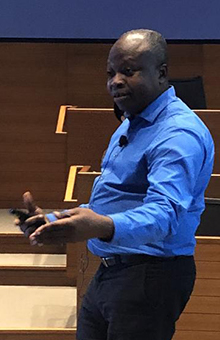In 2019, Dr. Albert Ahenkan of the University of Ghana Business School taught an elective course on the green economy as a visiting professor at Yale SOM. Now back at the University of Ghana, Ahenkan is preparing to teach the same course in an online format to students across the Global Network. We asked Ahenkan about what students can expect to learn from the course.
 What made you decide to teach this particular course as a Small Network Online Course?
What made you decide to teach this particular course as a Small Network Online Course?
My motivation to teach the Green Economy Management within the framework of a SNOC stems from two main factors: 1) the relevance of the green economy as an important vehicle for achieving business sustainability and sustainable development and (2) my experience as visiting professor at Yale SOM during the fall in 2019. Green economy has moved to the centre stage of the global development agenda as a new development concept that seeks to tackle sustainable development challenges and imbalances in growth strategies that underlie the global economic crisis and business sustainability challenges. An inclusive green economy is seen as an alternative to today's dominant economic model, which exacerbates inequalities, encourages waste, triggers resource scarcities, and generates widespread threats to the environment, business sustainability and human health. It provides a response to the multiple crises that the world and business community have experienced in recent years. After teaching this course as an elective during the fall-2 term at Yale SOM, I became convinced after students’ online and oral evaluation of the course. The students rated the course very highly and demonstrated its relevance for addressing global development challenges and business sustainability. The aim is to give opportunity to more students across the world to build their capacity in green economy. This will also significantly promote the internationalization drive of UGBS and enhance its collaboration between other global network partners. These are they key issues that inspired me to teach it online.
What does the global virtual environment of a SNOC provide for students in terms of cross-cultural learning, and how can this also help you?
The global virtual platform of SNOCs provides opportunities for cross-cultural learning and exchange of experiences among students and faculty across the world. The virtual platform will enable students to connect with other students around the world. This will allow for online collaborative learning and experience sharing that will foster creativity and cross cultural understanding. The platform will bring students around the world, who will come with different perspectives from diverse cultures. This will provide important and meaningful connections that can help students learn about their own and other societies, people, communication styles, and cultural norms and beliefs. It is therefore an opportunity to work on group projects and collaborate with international classmates. The program will help me to have insights into other business cultures and development challenges, attitudes, and problem-solving approaches from students across the world. This will enhance my understanding and approaches to teaching.
What do you hope students take away from your class that they can apply to their careers, regardless of the path they choose?
The concept of the green economy has emerged as a strategic priority for governments, the business community and the corporate world in general. This course seeks to help students to uncover pathways towards an inclusive green economy and business sustainability. As prospective business executives, corporate managers and investment community, students need to understand these critical global business and development challenges. Students will appreciate green economy as a driver of sustainable development, and be able to assess the impact of climate change on business sustainability, identify private sector investment opportunities in the green economy, and apply green economy and sustainability strategies for business development.
